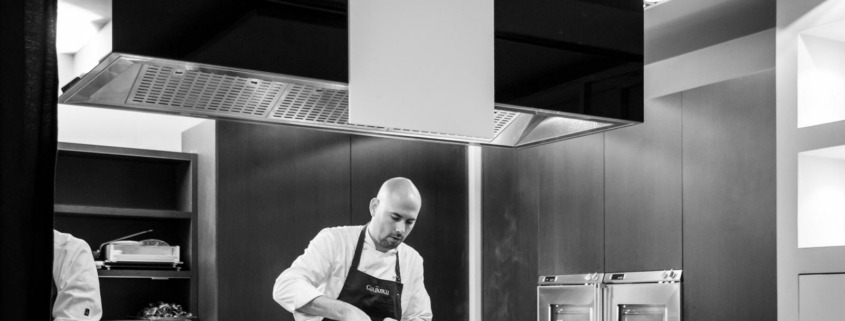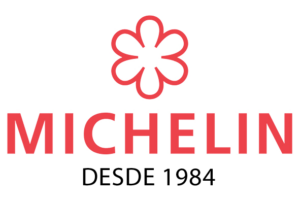Interview with Arnau Bosch
INTERVIEW WITH ARNAU BOSCH (CAN BOSCH)
Who are you?
I’m Arnau Bosch, I’m 30 years old. I am currently chef and co-owner with my father, my mother and my wife of the restaurant Can Bosch in Cambrils. Son of Joan Bosch and Montserrat Costa; second generation of the house and who have brought it to where it is today. We have had a Michelin star for 34 years and this year the restaurant celebrates its 50th anniversary (1969).
How did you experience food during your adolescence considering who your father is?
I guess you don’t realise how you experience it because for you it is normal, for example, to eat a beef steak from a good producer. Do not eat frozen fish, or vegetables that are not from the field or from a nearby greengrocer. And then, in this context of normality, you don’t realise that you’re eating like a privileged person until you see in your classmates or in the places you go that what you’re used to eating, the rest don’t usually eat.
At what point in your life did you become interested in gastronomy?
In adolescence, at 13-15 years of age. It is in my adolescence when I start to eat everything and I start to be interested in or enjoy eating certain things at home. And in restaurants, because we visited many with my parents.
What do you think about heart-healthy cuisine?
It is not so much what I think. Although I wouldn’t define it as heart-healthy, we make a very healthy cuisine, where the product is the most important thing. We have a fish and seafood restaurant. Product of the sea. It has a lot of fats and we also touch a lot of vegetables that come directly from our farmer. So in the end, you could say that our cuisine is already heart-healthy.
There was a time when Cambrils was a Michelin centre. The place with the most stars per capita. At that time, when you were working flat out, was health in gastronomy valued as it is now?
I guess not as much as now. At that time Spanish gastronomy, unlike in other countries, was very advanced. But not to the point of realising what may or may not be detrimental to our health. How certain products can affect us or how processed they are. Back then, it may not have been less healthy because it wasn’t as processed, but there wasn’t as much awareness of healthy eating.
At home as usual. Practising product-based cooking, fish and seafood; lots of vegetables from the garden… I don’t think much has changed. It has evolved for sure, we have always been there consciously or unconsciously applying it.
Do you take care of yourself gastronomically speaking?
Yes, and I also do it unconsciously. Like everything. When I feel like it, I even eat fried eggs with sobrasada, if I feel like it, but unconsciously I take care of myself, yes. Because my life goes better, my energy, my stomach, everything goes better if I take care of myself. I have been eating healthily for many years without thinking about it.
What is your favourite dish? If you had to have a last supper, what would you eat?
I always ask myself this question and I never know what to answer. Because when I eat boiled rice with a potato and three crushed garlic and some fish in it, I see the stars. The same as if I eat delicious tripe or a fetish product such as oysters or Tarragona prawns. I would not have a last supper…
You touch a lot of local products in your daily life. Do you think that’s healthier?
Yes, although a product is not healthier just because it is local. A person who is far away may be a better producer than one who is close, but obviously being close implies that you know him, that you care, that you buy from him. It means that the product does not travel, it does not spend time in the chambers, it is very fresh. In my case, yes, touching local produce is much healthier.
Bread is something your wife makes in the restaurant and that makes it healthier.
Yes, we have been baking bread for 12 years. My father took it upon himself to make bread one day and we haven’t stopped making it since. But it is true that with the arrival of my wife and her obsession with doughs, she started to make bread and with it, she began to wonder what type of flour to use and why, how to make a healthier bread, how to make it with a sourdough… In the end, it is true that we are a bit of bread freaks.
How do you see the evolution of heart-healthy gastronomy?
In terms of health and fitness, gastronomy is doing great because for some years now we have been moving towards temporary modernist trends. And I am not criticising it, they are the result of the discovery of new avant-garde gastronomic techniques.
We had somehow lost the essence of what we really have. And now, it seems that everyone is going back to what the product is again, to simplifying things. We have realised that we have a great product; that often less is more and that the simpler the preparation, the better the results. What does this imply? That there is more and more naked product on the tables, of better quality. Because it is given more importance and fewer additives or additions. For heart-healthy gastronomy, for me, it’s super positive, super favourable.
You have inherited a number of recipes from your father, and others you have added yourself. Now, two different eras coexist in the kitchen, with your father’s more historical recipes and the recipes you have created. Do you think that both moments in the history of gastronomy in your restaurant today are equally healthy? Or is one season healthier than another?
I believe that both are equally healthy. However, we can give an extra point to the one now because we are starting to focus a lot on vegetables. We are fortunate to have many fields close to home with very good farmers and acquaintances of ours, which helps us to get even more involved in researching and learning about vegetables. We are introducing them more and more, combined with fish and seafood, which is what we play at home and is great for them.
Red wine has been proven to be healthy. You have a historic winery with multiple and really important references. Have you always made such a big deal out of it?
Yes, we have always taken great care of wine at home, from research to storage, ageing and storage. It is something that my father has practised all his life and we are lucky to have an excellent historical wine cellar, a good stock of wine with a lot of tradition. Aging or conserving wine for many years and the great friendship we have with prestigious wineries all over Spain has allowed us to have a very extensive wine cellar with a wide range of references and a very wide range of years and solera. We currently have more than 1000 references in the winery, with well-known brands such as Vega Sicilia, Romanée Conti, Alvaro Palacios…











